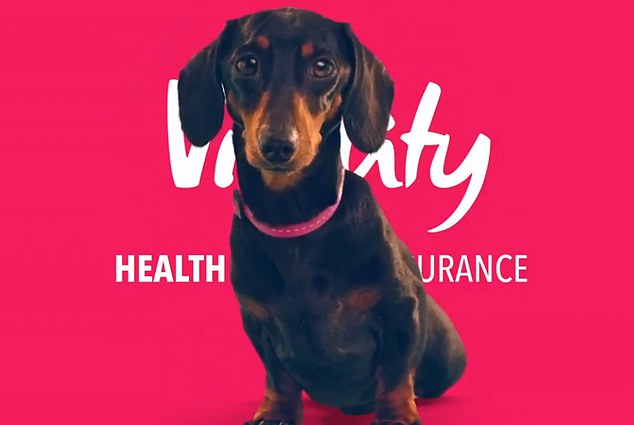Bad news for Churchill and Vitality: Vets call for adverts featuring English Bulldogs, Pugs and Dachshunds to be BANned over fears the breeds have been cruelly overbred to look ‘cute’
- Animal welfare group calls for ban on dogs with extreme body shapes in ads
- This includes English Bulldogs, made famous by Churchill’s insurance advertisements
He is Britain’s most famous nodding dog.
But experts warn against using English Bulldogs – as seen in Churchill’s insurance ads – to promote products.
An international animal welfare organisation has called for an end to the use of dogs with extreme body shapes in advertising and on social media due to their health problems.
Breeds also include dachshunds, such as those featured in Vitality’s insurance advertisements, and pugs and French bulldogs, which are also regularly used in promotional videos.
He is Britain’s most famous nodding dog. But experts warn against using English bulldogs – as depicted in Churchill insurance adverts – to promote products
According to the International Collaborative on Extreme Conformations in Dogs (ICECDogs), extreme conformation occurs when a dog’s appearance has been so significantly altered by breeding that the animals often suffer from poor health and welfare.
In their recently published guidelines, they call on all advertisers and social media users worldwide to immediately stop using images of dogs with extreme body types in public communications, unless these images are intended to protect the health and welfare of dogs.
Instead, they recommend that advertisers focus on using images that promote the physically healthy build of dogs.
Common examples of health and wellness issues associated with extreme body shapes include chronic pain, such as eye ulcers due to bulging eyes, or physical limitations, such as not being able to sleep or fully exercise due to breathing difficulties from a flat face.
Dr Dan O’Neill from the Royal Veterinary College in London is one of the founders of ICECDogs.
He said: ‘Millions of dogs worldwide still suffer from extreme and unnecessary body shapes every year.

Data shows that in 2023, more than half a million French Bulldogs and a quarter of a million Miniature Dachshunds (pictured in a Vitality advert) were owned in the UK, along with more than 180,000 Pugs and 130,000 English Bulldogs.
‘This new message from ICECDogs calls on advertisers to do their part to end the normalization of suffering due to extreme body shapes. Hopefully, it will contribute to the global movement to celebrate healthy body shapes in dogs instead.’
Despite growing concerns about health problems in certain breeds, more owners have been choosing to purchase dogs with extreme conformations over the past decade, the group said.
Examples of these include excessive skin folds, short tails, short legs, a convex or domed skull, inward or outward curled eyelids, and flat faces.
Data shows that in 2023, more than half a million French Bulldogs and a quarter of a million Miniature Dachshunds were owned in the UK, alongside more than 180,000 Pugs and 130,000 English Bulldogs.
It is believed that much of this increased demand is due to the fact that images of dogs with extreme shapes are regularly used as promotional material in advertising and on social media.

Despite growing concerns about health problems associated with certain breeds, more and more owners have been choosing to acquire dogs with extreme conformations in the past decade, the group said. These include excessive skin folds, short tails, short legs, a convex or domed skull, inward or outward-turning eyelids and flat faces. Pictured: A pug in a Three ad

Pugs featured in Vodafone’s advert for its Vodafone SuperNet 4G The Data Strong Network
The guidelines state: ‘Images of dogs with extreme body types are often selected for promotional materials to elicit ‘cute’, ‘adorable’ or even shocking reactions.
‘However, it is known that sharing such images increases the demand for dogs with naturally unhealthy body shapes and therefore harms animal welfare.
‘It is critical to reduce public exposure to images of dogs with extreme body shapes to prevent further normalization of naturally unhealthy body shapes in dogs.
‘Anyone who shares images of dogs must consider their ethical responsibility as an influencer of public perception.’
A Churchill spokesman commented on the guidelines: “The computer-generated ‘Churchie’ we have created for our current advertising campaign is an imaginary CGI character.”
